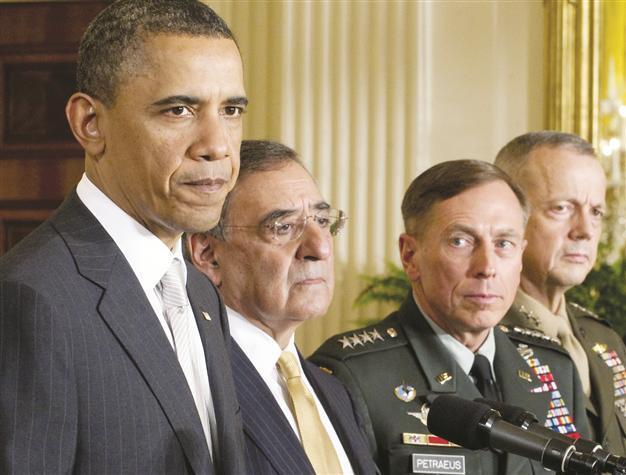Lawmakers question mails in Petraeus row
WASHINGTON

US President Barack Obama (L) announces he will nominate Leon Panetta (2nd L), currently the CIA chief, secretary of defense, Gen David Petraeus (2nd R) as the next director of the CIA, and Gen John Allen (R), as commander for US forces in Afghanistan in this 2011 photo. AFP photo
U.S. lawmakers are digging into the tangled tale of emails that exposed an extramarital affair ending David Petraeus’ CIA career and led investigators to a questionable relationship between a Florida socialite and the general commanding the war in Afghanistan. Their main question was this: Was national security threatened?
The extramarital affair was between Petraeus and his biographer Paula Broadwell, who U.S. officials say sent harassing, anonymous emails to a woman she apparently saw as a rival for Petraeus’ affections. That woman, Jill Kelley, in turn traded thousands of sometimes flirtatious email messages with General John Allen, possible evidence of another inappropriate relationship. A Pentagon official said only an investigation could determine if rules were broken. “‘Flirtatious’ can cover everything from something fairly innocuous all the way over to ‘sexting’ or something on those lines. It’s a broad term,” the official said.
The CIA’s acting director, Michael Morell, started answering lawmakers’ questions on Nov. 13 on Capitol Hill, meeting with top Senate intelligence officials to explain the CIA’s take on the events that led to Petraeus’ resignation. The lawmakers are especially concerned over reports that Broadwell had classified information on her laptop, though FBI investigators say they concluded there was no security breach.
A senior U.S. official told The Associated Press that other senior U.S. officials who read the emails determined that the exchanges between Allen and Kelley were not sexually explicit or seductive but included pet names such as “sweetheart” or “dear.” The official said that while much of the communication, including some from Allen to Kelley, is relatively innocuous, some could be construed as unprofessional and would cause a reasonable person to take notice.
The Wall Street Journal said Broadwell had sent a series of critical emails about Kelley to senior generals under the pseudonym KelleyPatrol, including one to Allen in which she called Kelley a “seductress.” Allen, 58, insisted he had done nothing wrong and worked to save his imperiled career.
President Barack Obama and Defense Secretary Leon Panetta backed Allen. “The president thinks very highly of General Allen and of his service to his country, as well as the job he has done in Afghanistan,” White House spokesman Jay Carney told reporters.
“He has faith in Allen,” Carney said. Panetta, currently on an official visit to Australia, also urged against jumping to any conclusions about Allen, saying the general had his “continued confidence.”
Morell, who has taken over Petraeus’ duties at the CIA, met with Senate Intelligence Committee Chairwoman Dianne Feinstein and ranking Republican Senator Saxby Chambliss of Georgia. Asked by reporters if there had been a national security breach with the Petraeus affair, Feinstein responded: “I have no evidence that there was at this time.” She said she expected Petraeus to testify this week or next.
Allen has been allowed to stay in his job as commander of the Afghan war and provide a leading voice in White House discussions on how many troops will remain in Afghanistan - and for what purposes - after U.S.-led combat operations end in 2014. But Obama put on hold Allen’s nomination to become the next commander of U.S. European Command as well as the NATO supreme allied commander in Europe, at the request of Defense Secretary Leon Panetta, until Pentagon investigators are able to sift through the 20,000-plus pages of documents and emails that involve Allen and Kelley.
